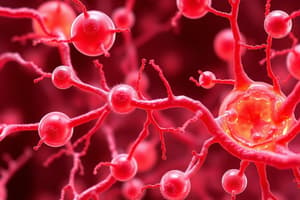Podcast
Questions and Answers
What is the primary basis for defining life?
What is the primary basis for defining life?
- The historical continuity of life (correct)
- The diversity of species
- The ability to reproduce
- Adaptation to environment
How long ago did the common ancestor of all life is believed to have arisen?
How long ago did the common ancestor of all life is believed to have arisen?
- 2 billion years ago
- 1 billion years ago
- 4 billion years ago (correct)
- 10 billion years ago
What preceded the origin of cellular life according to the content?
What preceded the origin of cellular life according to the content?
- Simple cells
- Organic compounds
- Multicellular organisms
- Replicating molecular systems (correct)
Which of the following is NOT mentioned as part of the concept of life?
Which of the following is NOT mentioned as part of the concept of life?
What aspect of individuals is most fundamental to life?
What aspect of individuals is most fundamental to life?
What type of evidence is lacking in the fossil record for early life stages?
What type of evidence is lacking in the fossil record for early life stages?
What is zoology primarily concerned with?
What is zoology primarily concerned with?
Which theory serves as the central organizing principle of biology?
Which theory serves as the central organizing principle of biology?
How do zoologists document animal life?
How do zoologists document animal life?
What does the chromosomal theory of inheritance explain?
What does the chromosomal theory of inheritance explain?
What does the study of fossils help reconstruct in zoology?
What does the study of fossils help reconstruct in zoology?
Which of the following methods is NOT commonly used in the study of animal life history?
Which of the following methods is NOT commonly used in the study of animal life history?
What is a key challenge in reconstructing the history of life according to zoologists?
What is a key challenge in reconstructing the history of life according to zoologists?
What do zoologists aim to explain through their research?
What do zoologists aim to explain through their research?
Flashcards are hidden until you start studying
Study Notes
Historical Continuity of Life
- Life is defined by its historical continuity and common descent, distinguishing it from non-living entities.
- The origin of life dates back nearly 4 billion years to a common ancestor.
- Molecular systems capable of replication, preceding cellular life, did not leave fossil evidence.
- All current life forms are descendants of one common ancestor, emphasizing the significance of reproduction, heredity, and variation.
Fundamentals of Zoology
- Zoology is the scientific study of animal life, grounded in centuries of human observation and cultural mythology.
- The discipline incorporates advanced scientific methods and technologies to explore the complexities of animal life.
- A systematic approach organizes animal diversity and contributes to understanding how such diversity originated.
- Central themes include the theory of evolution and the chromosomal theory of inheritance, which are crucial for explaining heredity and variation in animals.
Fundamentals of Life History
- Continuous modification is the essence of life, necessitating a reconstruction of its history through fossils and existing forms.
- Understanding evolutionary processes requires recognizing that some organisms may leave little or no fossil evidence.
- Detailed analysis of fossils, morphology, reproduction, and development is essential to reconstruct life’s history.
- The study of life’s history reveals how ancestral lineages led to the diversity of animals we observe today.
Studying That Suits You
Use AI to generate personalized quizzes and flashcards to suit your learning preferences.




